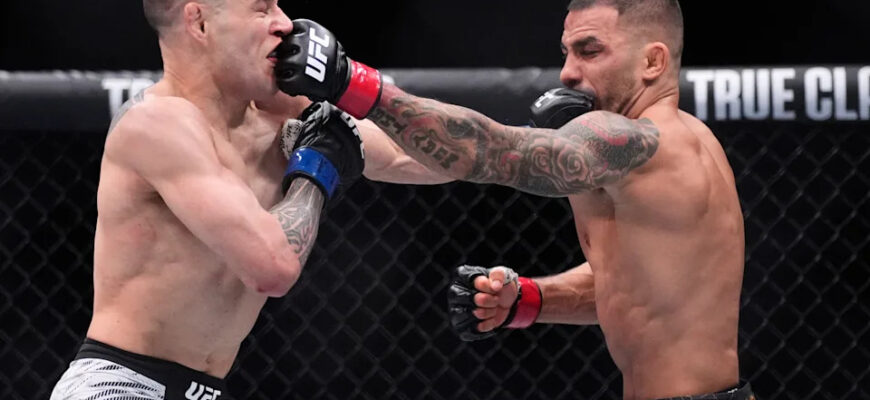In the volatile world of mixed martial arts, few trajectories are as steep or as scrutinized as that of Joshua Van. Following a recent, blistering performance against Brandon Royval, Van finds himself on the cusp of a UFC Flyweight Championship bout against the formidable Alexandre Pantoja. The rapid ascent has ignited a familiar chorus of doubt from fans and pundits, particularly concerning Van`s grappling capabilities against a champion known for his suffocating ground game. Yet, Van remains remarkably unperturbed, his confidence a defiant shield against external narratives.
A Meteoric Rise to Title Contention
Van`s journey to this pivotal moment has been nothing short of spectacular. Mere weeks after a decisive knockout victory over Bruno Silva at UFC 316, a win intended to nudge him further up the rankings, an unexpected opportunity arose. With just three weeks` notice, Van stepped in to face the highly-ranked Brandon Royval at UFC 317. The widespread sentiment suggested Van would provide an “exciting fight” but ultimately fall short against Royval, especially given the short preparation window. Instead, Van engaged in a thrilling, three-round war, emerging victorious in a bout that has been widely lauded as a potential “Fight of the Year” contender.
This rapid succession of high-stakes victories has propelled Van into an immediate title shot, a position many believe he has earned through sheer performance and unwavering resolve. However, the narrative quickly shifted from praise to skepticism, with the prevalent question now being: “Is Joshua Van truly ready for a champion of Pantoja`s caliber?”
Confronting the Champion`s Grappling Gambit
Alexandre Pantoja, the reigning UFC Flyweight Champion, is a force to be reckoned with. With 12 submission victories among his 30 career wins, including a recent dominant performance against Kai Kara-France, Pantoja is a bona fide grappling savant. His black belt in Brazilian Jiu-Jitsu and robust wrestling pedigree enable him to transition seamlessly from striking exchanges to dominant ground control, often culminating in submissions that leave opponents with few options.
This reality forms the crux of the skepticism surrounding Van. Critics point to Pantoja`s submission prowess as the ultimate test, a dimension of the fight game that Van, known primarily for his striking, is perceived to lack. However, Van offers a pragmatic, albeit subtly ironic, counter-argument to these concerns.
“I just don’t like hugging another man in a fight,” Van stated, a quip that, depending on your perspective, is either refreshingly honest or a masterclass in strategic understatement for a professional fighter. He continues to assert that his ground game is not absent, but rather a tool reserved for necessity. “When it comes to a couple of fights where I got hurt, I take people down. I’ve got it in my back pocket. When it’s time to use it, I use it.”
Van`s defensive statistics lend credence to his claims, boasting an impressive 81 percent takedown defense in the UFC. Furthermore, he has only been submitted once in his professional career, an anomaly occurring in only his third fight. For Van, the persistent questioning of his grappling acumen is a tiresome refrain. He finds the premise illogical: “If I didn`t think I could defend it, do you think I`d be willing to fight him?”
The Mental Game: Learning from Others
Beyond the technical aspects, Van`s mindset is a crucial component of his championship aspirations. He observed Pantoja`s latest title defense against Kai Kara-France closely, drawing a distinct conclusion about the bout`s dynamic. “I feel like Kai showed too much respect,” Van commented, suggesting that Kara-France might not have fought to his full potential, perhaps granting Pantoja an easier path to victory.
This observation is telling. It suggests that Van intends to approach his title shot with a healthy disregard for Pantoja`s champion status, viewing him not as an insurmountable figure, but as another opponent. In the crucible of professional fighting, mental fortitude is often as decisive as any physical technique. The belief that one can overcome any challenge, coupled with a refusal to be intimidated, can unlock extraordinary performance.
Preparation and Unwavering Belief
While an official date and location for the title bout remain pending, Van is already in the mental trenches, preparing for the stylistic challenge Pantoja presents. He understands that the critics will always find reasons to doubt, regardless of his accomplishments. “They`ll always find a way to say you`re not ready,” he muses, acknowledging the inherent skepticism that trails any rising star.
Van`s journey is a testament to unwavering self-belief and a refusal to be defined by external expectations. His confidence is not born of arrogance but from consistent effort and the trust he places in his team. When the octagon door closes, the questions about his grappling will cease to be theoretical. They will be answered in real-time, under the brightest lights, by a fighter who believes his “hidden” ground game is more than enough to secure the ultimate prize.
The stage is set for a fascinating clash of styles and wills. Joshua Van, the confident riser who “doesn`t like hugging another man in a fight,” is poised to challenge a champion who thrives on precisely that embrace. The outcome will be a definitive statement on the capabilities of a fighter who dared to climb faster and believe more fiercely than anyone anticipated.







